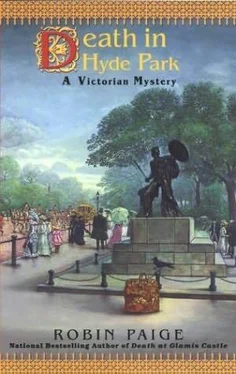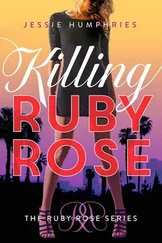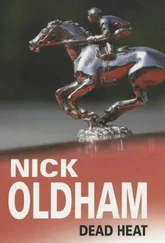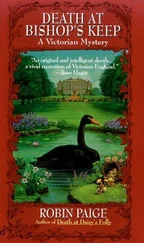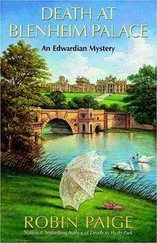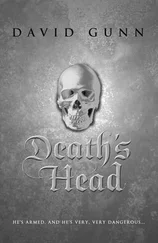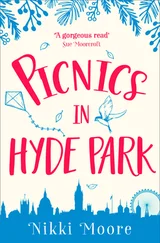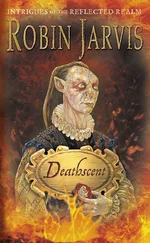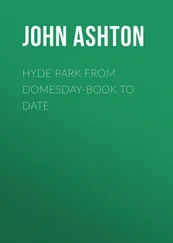Robin Paige - Death in Hyde Park
Здесь есть возможность читать онлайн «Robin Paige - Death in Hyde Park» весь текст электронной книги совершенно бесплатно (целиком полную версию без сокращений). В некоторых случаях можно слушать аудио, скачать через торрент в формате fb2 и присутствует краткое содержание. Жанр: Классический детектив, на английском языке. Описание произведения, (предисловие) а так же отзывы посетителей доступны на портале библиотеки ЛибКат.
- Название:Death in Hyde Park
- Автор:
- Жанр:
- Год:неизвестен
- ISBN:нет данных
- Рейтинг книги:5 / 5. Голосов: 1
-
Избранное:Добавить в избранное
- Отзывы:
-
Ваша оценка:
- 100
- 1
- 2
- 3
- 4
- 5
Death in Hyde Park: краткое содержание, описание и аннотация
Предлагаем к чтению аннотацию, описание, краткое содержание или предисловие (зависит от того, что написал сам автор книги «Death in Hyde Park»). Если вы не нашли необходимую информацию о книге — напишите в комментариях, мы постараемся отыскать её.
Death in Hyde Park — читать онлайн бесплатно полную книгу (весь текст) целиком
Ниже представлен текст книги, разбитый по страницам. Система сохранения места последней прочитанной страницы, позволяет с удобством читать онлайн бесплатно книгу «Death in Hyde Park», без необходимости каждый раз заново искать на чём Вы остановились. Поставьте закладку, и сможете в любой момент перейти на страницу, на которой закончили чтение.
Интервал:
Закладка:
CHAPTER NINETEEN
Sed quis custodiet ipsos custodes? (Who guards the guardians?)
JuvenalThere has always been a question of oversight. Who polices the police? Who spies on the spies?
Albert J. Williams, “A Brief History of British Anarchism,” 2002It was well past the lunch hour when Charles found the Little Moscow Cafe. It was entered from a rear alley off Whitechapel Road, next to the Post Office. Six narrow cement steps led down to a basement, a large, windowless room filled with diners seated at oilcloth-covered tables and in wooden booths around the walls. Painted pillars supported a low wooden ceiling, and gas jets illuminated the crowded room with a dusky glow. The walls and pillars were plastered with Russian posters, playbills, and newspaper clippings. In one corner, a balalaika player entertained with traditional Russian music. A menu board at the entrance announced in both Russian and English that diners today would be enjoying borscht, pirozhki (meat pie), golubtsi (stuffed steamed cabbage rolls), and yablochny rulet (apples, walnuts, and raisins wrapped in pastry).
A waiter bustled up. “Table for one, sir?”
“I am meeting Rasnokov,” Charles replied. “Is he here?”
“His usual corner,” the waiter said with a careless gesture. “You will have lunch?”
“Yes,” Charles said. “And I’ll have beer, please. Kars, if you have it.”
Rasnokov had finished his lunch and was smoking a Turkish cigarette over a cup of coffee. He looked up inquiringly as Charles approached. He was a tall man of indeterminate age, thin, with slightly stooped shoulders, and clean-shaven. He wore a rusty black suit and round steel-framed eyeglasses that gave him a studious look.
“My name is Sheridan,” Charles said. “I recently met a gentleman who suggested I look you up and ask if you had received a message from Smersk.”
Rasnokov tapped his cigarette into the ashtray with a long, delicate finger. His hands might have been the hands of a surgeon. “Sit down,” he said, in unaccented, expressionless English.
The waiter appeared at the booth with a bottle of beer. “Your lunch will be ready in a few moments,” he said to Charles. Rasnokov pushed his cup forward. The waiter put down the beer, produced a pot of coffee, and poured.
The balalaika player swung into a soft rendition of “Moscow Nights,” obviously a familiar favorite, since several of the diners began to sing the Russian words. Rasnokov stubbed out his cigarette. “What do you want?” he asked indifferently, under the music. “I don’t know you.”
“We have a mutual friend,” Charles replied. He raised his beer bottle as if in salute. “In Queen Anne’s Gate.”
“Ah.” Rasnokov’s face became regretful, as if Charles had said that a friend had died, or that Rasnokov should have to do something he didn’t want to do. “You have a proposition for me, then?”
“A question,” Charles said, and got right to it. “What do you know of the Hyde Park affair?”
There was a slight hesitation, and when Rasnokov spoke, there was a defensive edge in his voice. “I’ve already given that report.”
“You said, I understand, that two were involved in the business.”
“Yes, two. The boy and a Russian named Kopinski. Both of them worked at the Clarion. Kopinski instigated the bombing and provided the materials.” Rasnokov frowned, as if he were offended. “It’s all in my report, if you’d taken the trouble to read it.”
“Only the two? What about Gould and Mouffetard?”
Rasnokov blinked behind his glasses, but was delayed in answering while the waiter set down in front of Charles a bowl of borscht and a plate with a fragrant meat pie and two thick cabbage rolls.
Charles picked up his soup spoon. “You were saying?”
“I know nothing of Gould,” Rasnokov replied sulkily. “Mouffetard was not involved, to my knowledge, although he appeared to be on friendly terms with the boy.”
“Then how did it happen that a bomb and bomb-making instructions were found in Mouffetard’s possession? The Yard has arrested him, you know. And Gould as well. Both are charged with making bombs, along with Kopinski. Why did you not include their names in your report?”
Rasnokov shrugged. He still wore no expression, and his spectacled eyes were guarded, the eyes of a physician who is withholding bad news from a patient. “Perhaps my information was not as complete as I thought. Or perhaps the Yard has its own reasons for implicating the others.” His dry chuckle held no humor. “That inspector, that Ashcraft. He is a wily one. He does not always play straight.”
Charles thought it ironic that a secret agent would accuse a Yard detective of underhanded dealings, although in this case, Rasnokov was almost certainly right. It was more curious, however, that the man seemed acquainted with Ashcraft, and familiar with his ways. Charles wondered if Wells was aware of this, and what it might suggest about Rasnokov’s way of doing business.
“But Kopinski is the one who managed Messenko?” Charles persisted. “The only one?” He fixed Rasnokov with his gaze. “You’re sure of that?”
“Kopinski is the one,” Rasnokov repeated positively, as if offering a prescription for a medicine that would somehow fix things up. “The whole affair was his idea, start to finish. He is a most dangerous man, though he may not seem so.” He reached into his pocket, took out several small coins, and laid them beside his unfinished coffee. “Is that all?”
“For the moment,” Charles replied, digging into his meat pie. The savory fragrance of hot beef and pastry rose up temptingly. “They make a fine pirozhki here, don’t you think?”
For answer, Rasnokov slid out of the booth. “If that’s all, I’ll take my leave.” Standing, he bent over and said in a low voice, “Tell our friend in Queen Anne’s Gate that I will be unavailable for a fortnight. Business is taking me out of the country.”
Charles, watching him go, felt disturbed. Either Wells had not told him all he knew about Rasnokov, or there was more to the man than Wells knew. And it was the latter, Charles felt, that was more likely.
CHAPTER TWENTY
Not many years ago ladies’ clubs were comparatively unknown; now-a-days, almost every up-to-date London woman belongs to one, butterfly of fashion and working bee alike… But what do the members do at their clubs? This is what we are about to investigate.
Sheila E. Braine, “London’s Clubs for Women,” in Edwardian London, 1902It is said that the fluffers-the people who clean the tunnels and Underground stations in London-were often frightened by the spectral figure of a woman in flowing white robes who appeared on the tracks at night at the site of the Aldwych Underground Station. The ghost was believed to be that of an actress who died before she could take her final curtain call, for the Aldwych Station (now closed except for use as a film and television set and for trendy opening-night parties) was built on the site of the old Royal Strand Theater. This venerable institution was erected in 1832, condemned and rebuilt in 1886, and finally razed in 1905, three years after Nellie Lovelace starred in the record-breaking musical comedy, The Chinese Honeymoon. The fact that it ran for 1,075 performances did not, unfortunately, preserve the theater from demolition.
But Aldwych Station was yet to be built, the Royal Strand had not yet been violated by the wreckers, and on this particular rainy August afternoon, as Kate’s cab drew to a stop in Aldwych, Nellie had already finished rehearsal and was waiting outside, under the shelter of her umbrella. She didn’t have to be back to the theater for the night’s performance until seven-thirty, so Kate would be able to enjoy her company for several hours, at least.
Читать дальшеИнтервал:
Закладка:
Похожие книги на «Death in Hyde Park»
Представляем Вашему вниманию похожие книги на «Death in Hyde Park» списком для выбора. Мы отобрали схожую по названию и смыслу литературу в надежде предоставить читателям больше вариантов отыскать новые, интересные, ещё непрочитанные произведения.
Обсуждение, отзывы о книге «Death in Hyde Park» и просто собственные мнения читателей. Оставьте ваши комментарии, напишите, что Вы думаете о произведении, его смысле или главных героях. Укажите что конкретно понравилось, а что нет, и почему Вы так считаете.
